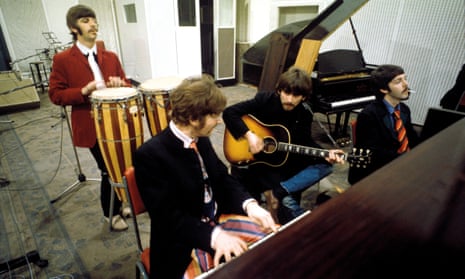In 1987, Sgt Pepper’s Lonely Hearts Club Band was released on CD for the first time. It was, by some considerable distance, the most ballyhooed reissue in the history of pop. A two-hour documentary about the album and its place in history was shown at prime time on ITV, even then a very peculiar place to find Allen Ginsberg and Abbie Hoffman discussing LSD and the Exorcism of the Pentagon protest.
Elsewhere, the reissue was promoted by EMI as “the most important record ever released on compact disc” and, bizarrely, as “the Beatles’ first great album”, the latter comment both ludicrous and in keeping with the kind of hyperventilated judgment that Sgt Pepper attracted from the off: “a decisive moment in western civilisation”, opined theatre critic Kenneth Tynan in the Times, shortly after the album’s original release.
There’s an argument that it was this event that really kicked off the heritage rock industry, and led us, ultimately, to where we are today: a super-deluxe six-disc box-set version of Sgt Pepper, complete with facsimile posters, hardback book and a 3D lenticular sleeve that, ironically, gives the cover something of the look of Their Satanic Majesties Request, the Rolling Stones’ reviled attempt to rival the Beatles’ psychedelic masterpiece.
It’s all beautifully done, as you might expect: few organisations part fans from their cash with such good taste and elegance as Apple Corps. Giles Martin’s remix is a vast improvement on the old stereo version – more muscular, with an unexpected emphasis placed on Ringo Starr’s drums – although the original mono mix, also here, is the one with the Beatles’ fingerprints on it. Twenty-two years after Paul McCartney suggested that any further attempts to raid the store of unreleased Beatles material would have to be called Scraping the Bottom of the Barrel, enough outtakes and alternative versions have been grubbed together to fill three CDs. If the feeling that the really good stuff from the cutting-room floor came out years ago on the second Anthology compilation never quite lifts, the raw early versions of Fixing a Hole and Being for the Benefit of Mr Kite! give you an idea of what Sgt Pepper might have sounded like if the Beatles had chosen to go back on the road and play it live. There’s also a certain hilarious bathos about the band’s original idea for the finale of A Day in the Life: all that sonic innovation in the preceding 40 minutes – all the phasing and varispeed and daring tape-splicing and influences from musique concrète – and they initially planned to draw the track to a conclusion with some humming.
The standard line about the album is that, at its centre, it’s a work of tremendous warmth and inclusion, that attempts, as Ed Vulliamy writes in the accompanying book, to “embrace everybody – ‘the man from the motor trade’, ‘the girl with kaleidoscope eyes’”. There are moments where it sounds like a high-water mark of hippy-era optimism before disillusion set in. Their fans are lovely and the band want to take them home, life is getting better and a splendid time is guaranteed for all – including traffic wardens, worried parents of errant teens and cosy sexagenarian couples.
But Sgt Pepper often seems an album as much about rock star detachment and ennui as it is about peace and love, from George Harrison and his ghastly-sounding friends congratulating themselves for being much more enlightened than everyone else on Within You Without You (in fairness, the smugness of the sentiment is ameliorated by both the magical quality of the music that accompanies it and the burst of mocking laughter at the track’s conclusion) to John Lennon, cocooned and adrift in his Weybridge mansion, alternately cursing the suburbs and his own stoned indolence – “everyone you see is full of life” – on Good Morning Good Morning.
Indeed, the Lennon that journalist Maureen Cleave famously profiled in 1966 – so secluded and listless that he didn’t know what day it was, living a life that you would have described as humdrum were it not for the gargantuan quantities of LSD he was ingesting – is ever-present on Sgt Pepper. His songs frequently seem to be about how acid could refract the mundane – idly leafing through the newspapers, looking at your kid’s schoolwork, buying a poster – into something fantastical, or at least how it could do that if you were John Lennon. Elsewhere, even Paul McCartney allows himself a brief fame-induced existential crisis. A feeling of unease permeates the lyrics of Fixing a Hole, at odds with the jaunty then beatific backing: McCartney trapped in a home besieged by fans – “people standing there … they worry me” – trying to stave off dark thoughts with menial household tasks.
There’s a sense that it was this side of Sgt Pepper, rather than the message of universal brotherhood, that had the most impact, at least on the Beatles’ career. The same weird cocktail of doubt and panic – the sense that you could feel constrained and empty even in a band as expansive as the Beatles – and overarching, cossetted self-belief that lurks beneath the album’s DayGlo facade fuelled everything from their dalliance with the maharishi to Apple’s doomed experiment in “western communism”. Rather than the grandiose, state-of-the-world address it was immediately taken as, perhaps Sgt Pepper is something less ostentatious and more personal: an album about hopes and fears. As it turned out, more of the latter would be realised than the former.





Comments (…)
Sign in or create your Guardian account to join the discussion